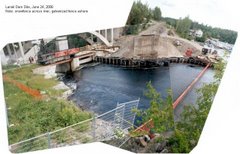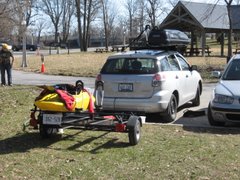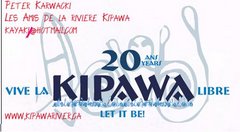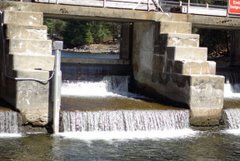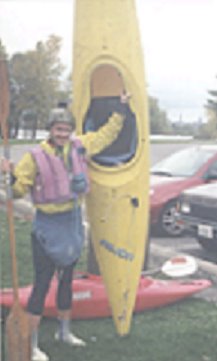Dear Sir;
As a Canadian who has long canoed, kayaked and fished in our rivers and streams, the potential loss of some of my favorite waterways, and some I have yet to experience simply from the stroke of a politician or bureaucrates pen under the provisions of Bill C-10 is very disturbing. The measure is insupportable in my view.
The proposal to substantially change the NWPA Navigable Waters Protection Act which has posed an automatic trigger for Environmental Assessment for bridges, dams, booms and weirs will almost certainly lead to shortened or ruined navigability for many of these waterways.
As I see it, in its effort to help the economy on the short term, the government will likely also damage navigabilty and also as an unintentioned consequence, damage the environment and I believe many share this view.
My experience shows that depending solely on bureaucrates is not a good idea. Public interevention and oversight is critical. We simply cannot rely on the public service without public vigilance and for that we need mandatory public consultation, not class reviews or decisions made behind the scenes by cooperating government agencies. We must remove politics from these decisions and enshrine the precautionary principle, above all, do no harm by simply erring on the side of caution.
I understand that navigabilty can be problematic. Canoes and kayaks can go almost anywhere, but remember, these small streams are simply part of the larger drainage, Its all connected. We mustn't use our waterways as garbage dumps, or land fills. They are the habitat of wildlife and an important link in the chain of life.
I have heard John Baird speak about "shovel ready: projects has if the environment is a pesky nuisance to developers and other government bodies. Oh how I wish Mr. Baird, who has likely never used a shovel in his life, could see how wrong this viewpoint is. At any rate the inclusion of changes to the NWPA in a budget bill is a mean spirited way to have it pass without any serious debate. The thing is, Liberals as well as Conservatives will support this so politicians in general are to blame: period.
Are they inviting a groundswell of resentment and uprising of the general population with acts such as this? Canadians face the loss of their waterways with the stroke of a pen. Protection is already weak. We must learn to treasure these resources, not find a way to make more money from them at a time when our wilderness shrinks daily.
Please all Canadians to urge Mr. Harper reconsider this offensive and highly unsupportable addition to Bill C-10.
Friday, February 13, 2009
Wednesday, February 11, 2009
23rd Annual Kipawa River Rally

NOLAC (Northern Ontario Liquid Adventurers and Les Amis de la Riviere Kipawa
Invite you to:
the 23rd Annual Kipawa River Ralley

23rd Annual Kipawa River Rally
June 27th and 28th, 2009
http://www.cckevm.org/calendrier.jsp

How to Get there?

Tuesday, February 10, 2009
Whats all this about classes?
5.1 (1) Despite section 5, a work may be built or placed in, on, over, under, through or across any navigable water without meeting the requirements of that section if the work falls within a class of works, or the navigable water falls within a class of navigable waters, established by regulation or under section 13.
so what is section 13?
328. Section 13 of the Act is replaced by the following:
MINISTERIAL ORDERS
13. (1) For the purposes of section 5.1, the Minister may, by order,
(a) establish classes of works or navigable waters; and
(b) impose any terms and conditions with respect to the placement, construction, maintenance, operation, safety, use and removal of those classes of works or works that are built or placed in, on, over, under, through or across those classes of navigable waters.
(2) An order under subsection (1) (a) is not a statutory instrument within the
meaning of the Statutory Instruments Act; and
(b) shall be published in the Canada Gazette within 23 days after the day on which it is made.
(3) An order may incorporate any material by reference, regardless of its source, either as it exists on a particular date or as amended from time to time.
so what is section 13?
328. Section 13 of the Act is replaced by the following:
MINISTERIAL ORDERS
13. (1) For the purposes of section 5.1, the Minister may, by order,
(a) establish classes of works or navigable waters; and
(b) impose any terms and conditions with respect to the placement, construction, maintenance, operation, safety, use and removal of those classes of works or works that are built or placed in, on, over, under, through or across those classes of navigable waters.
(2) An order under subsection (1) (a) is not a statutory instrument within the
meaning of the Statutory Instruments Act; and
(b) shall be published in the Canada Gazette within 23 days after the day on which it is made.
(3) An order may incorporate any material by reference, regardless of its source, either as it exists on a particular date or as amended from time to time.
Eco Justice Comments on the Burying of Changes to the NWPA within the Omnibus Bill c-10
Ecojustice Memorandum
Re: Proposed amendments to the Navigable Waters Protection Act and the
erosion of public navigation rights on Canadian waterways
Date: February 9, 2009
Author: Will Amos, Staff Lawyer, uOttawa-Ecojustice Environmental Law Clinic, with research assistance from Yolanda Saito and Sam Sonshine
SUMMARY:
The Budget Implementation Act, 20091, an omnibus bill tabled by the Conservative Government on Friday, February 6, 2009, proposes a radical transformation of the
regime that protects the navigability of Canada’s rivers and streams. The proposed
amendments to the Navigable Waters Protection Act2 (NWPA) would create a “tiered” or
“class system” for Canadian navigable waterways, granting the Government a
discretionary authority to identify waterways deemed worthy and unworthy of federal
protection. Those waterways that are declassified would not be subject to the existing NWPA requirement that all works impacting navigable waters undergo an approval process. This approval process, which includes public notification and which triggers a federal environmental assessment, is at the core of the federal government’s clear constitutional jurisdiction over navigation and pursuant to s. 91(10) of the Constitution Act, 1867. The amendments are intended to limit the applicability of the Act and hasten the approval process for works that interfere with the right of navigation.
In the opinion of the author, these changes are an unnecessary form of deregulation that would undermine the government’s public trust duty to protect Canadians’ right to navigate waterways in a fair and transparent manner.
These proposed NWPA amendments will:
· Limit navigation rights by impacting the long-standing right to navigate and
enjoy free access to Canada’s waterways;
· Deregulate the protection of navigable waterways by significantly narrowing
Cabinet and the Transport Minister unfettered discretion to further exempt
certain “classes of works” and “classes of waterways” from the approvals
process under the Act;
· Reduce transparency and accountability by eliminating the need for public
notification and consultation on all projects that the Government determines not
to “substantially” interfere with navigation.
CONCLUSION
The author concludes that the proposed NWPA amendment will negatively impact the
free access of Canadians to navigable waterways, and will lessen the degree of federal oversight on projects that impact this area of federal jurisdiction. Furthermore, by reducing requirements for federal approvals of works that interfere substantially with navigation, the streams and creeks (capillaries and veins) of our lakes, wetlands and rivers will be negatively impacted.
Although the purpose of the NWPA is the protection of public navigation rights, this
important objective indirectly contributes to the protection of Canada’s environment
through the triggering of the Canadian Environmental Assessment Act (when an NWPA
approval is required). The net result is less navigational and environmental protection, less accountability, and less consultation. Such changes are inappropriately achieved through omnibus budgetary legislation, and ought to be debated in a fulsome manner before Parliament and appropriate standing committees.
Re: Proposed amendments to the Navigable Waters Protection Act and the
erosion of public navigation rights on Canadian waterways
Date: February 9, 2009
Author: Will Amos, Staff Lawyer, uOttawa-Ecojustice Environmental Law Clinic, with research assistance from Yolanda Saito and Sam Sonshine
SUMMARY:
The Budget Implementation Act, 20091, an omnibus bill tabled by the Conservative Government on Friday, February 6, 2009, proposes a radical transformation of the
regime that protects the navigability of Canada’s rivers and streams. The proposed
amendments to the Navigable Waters Protection Act2 (NWPA) would create a “tiered” or
“class system” for Canadian navigable waterways, granting the Government a
discretionary authority to identify waterways deemed worthy and unworthy of federal
protection. Those waterways that are declassified would not be subject to the existing NWPA requirement that all works impacting navigable waters undergo an approval process. This approval process, which includes public notification and which triggers a federal environmental assessment, is at the core of the federal government’s clear constitutional jurisdiction over navigation and pursuant to s. 91(10) of the Constitution Act, 1867. The amendments are intended to limit the applicability of the Act and hasten the approval process for works that interfere with the right of navigation.
In the opinion of the author, these changes are an unnecessary form of deregulation that would undermine the government’s public trust duty to protect Canadians’ right to navigate waterways in a fair and transparent manner.
These proposed NWPA amendments will:
· Limit navigation rights by impacting the long-standing right to navigate and
enjoy free access to Canada’s waterways;
· Deregulate the protection of navigable waterways by significantly narrowing
Cabinet and the Transport Minister unfettered discretion to further exempt
certain “classes of works” and “classes of waterways” from the approvals
process under the Act;
· Reduce transparency and accountability by eliminating the need for public
notification and consultation on all projects that the Government determines not
to “substantially” interfere with navigation.
CONCLUSION
The author concludes that the proposed NWPA amendment will negatively impact the
free access of Canadians to navigable waterways, and will lessen the degree of federal oversight on projects that impact this area of federal jurisdiction. Furthermore, by reducing requirements for federal approvals of works that interfere substantially with navigation, the streams and creeks (capillaries and veins) of our lakes, wetlands and rivers will be negatively impacted.
Although the purpose of the NWPA is the protection of public navigation rights, this
important objective indirectly contributes to the protection of Canada’s environment
through the triggering of the Canadian Environmental Assessment Act (when an NWPA
approval is required). The net result is less navigational and environmental protection, less accountability, and less consultation. Such changes are inappropriately achieved through omnibus budgetary legislation, and ought to be debated in a fulsome manner before Parliament and appropriate standing committees.
Monday, February 9, 2009
Lake Ontario Waterkeeper
http://www.waterkeeper.ca/2008/05/12/right-to-navigation-under-review/
http://waterkeeper.ca/documents/2008-05-12_NavWater.comment.pdf
TRANS committee
http://www2.parl.gc.ca/CommitteeBusiness/CommitteeMeetings.aspx?Cmte=TRAN&Language=E&Mode=1&Parl=39&Ses=2
"stimulate our economy":
http://www2.parl.gc.ca/HousePublications/Publication.aspx?DocId=3543792&Lang
uage=E&Mode=1&Parl=39&Ses=2
minutes from Tuesday, June 3,
2008
http://www.waterkeeper.ca/2008/05/12/right-to-navigation-under-review/
http://waterkeeper.ca/documents/2008-05-12_NavWater.comment.pdf
TRANS committee
http://www2.parl.gc.ca/CommitteeBusiness/CommitteeMeetings.aspx?Cmte=TRAN&Language=E&Mode=1&Parl=39&Ses=2
"stimulate our economy":
http://www2.parl.gc.ca/HousePublications/Publication.aspx?DocId=3543792&Lang
uage=E&Mode=1&Parl=39&Ses=2
minutes from Tuesday, June 3,
2008
GOVERNMENT’S BUDGET IMPLEMENTATION ACT ERASES THE PUBLIC RIGHT OF NAVIGATION IN CANADA
GOVERNMENT’S BUDGET IMPLEMENTATION ACT
ERASES THE PUBLIC RIGHT OF NAVIGATION IN CANADA
On Friday February 6, 2009, the federal Conservative government
introduced its Budget Implementation Act (BI Act).
This Act is in fact an omnibus bill that introduces a series of sweeping
legislation changes, including amendments to the Navigable Waters
Protection Act (NWPA).
The proposed amendments to the NWPA will permanently erase the public
right of navigation in Canada and will have serious consequences for the
environmental health of Canadian waterways.
Under the proposed new NWPA, waterways in Canada will only be considered
navigable under the sole discretion of the Minister of Transport.
The proposed new NWPA also gives the Minister of Transport sole
discretion to determine whether or not any proposed project (“work”) on
a Canadian waterway will have an impact on navigation.
The proposed new NWPA grants the Minister of Transport the authority to
change, at any time, the criteria used to assess whether a waterway is
navigable, or whether a work or type of work may interfere with
navigation.
The four named works (bridges, booms, dams, and causeways), added to the
NWPA in 1883 because these structures, by their very nature, interfere
with navigation…have been removed.
The government has introduced these changes to the NWPA without
consulting with:
- First Nations
- Paddling organizations
- The outdoor tourism industry
- Cottage associations
- River advocacy groups
- Anglers and hunters
- Anyone who uses Canadian waterways for business or recreation
Our position is:
- the NWPA would benefit from a comprehensive review and amendments to
modernize and streamline administrative processes
- this government does not have a mandate to erase the public right of
navigation in Canada
- these changes to the NWPA will diminish free access to our natural
environment for all Canadians
- these changes to the NWPA will damage Canadian waters
- the government is acting irresponsibly and radically
- the government is not acting in the best interest of Canadians
Canada was discovered, explored and developed through the navigation of
our waterways. The public right of navigation a fundamental part of what
it means to be Canadian.
The Government of Canada, under the pretext of helping the economy, is
erasing our right, our history, our heritage.
There is something you can do—raise your voice.
1) Inform yourself and others: Copy and paste this message into an
email or a facebook message to your friends and encourage them to take
action. We can be effective by working together. Every letter, every
phone call, and every email will help.
2) Tell the government you care about Canada’s waterways and that you
do not support the proposed amendments to the NWPA or the elimination of
the public right of navigation in Canada.
Send an email to the people listed below and express your concerns about
the use of the Budget Implementation Act to make sweeping changes to
legislation that is intended to protect Canadian waters and the rights
of Canadian citizens.
Insist that no changes to the NWPA be made before a full and
comprehensive public consultation process occurs.
Email:
National Manager, Navigable Waters Protection Program, David
Osbaldeston:
OSBALDD@tc.gc.ca
Minister of Transportation, John Baird:
bairdj@parl.gc.ca
Minister of Environment, Jim Prentice:
Prentice.J@parl.gc.ca
Opposition transportation critics:
Volpej@parl.gc.ca
Bevington.D@parl.gc.ca
lafram0@parl.gc.ca
will.munsey@greenparty.ca
Opposition environment critics:
McGuintyD@parl.gc.ca
Duncan.L@parl.gc.ca
bigrab@parl.gc.ca
petergraham@greenparty.ca
Opposition water critics:
scarpf@parl.gc.ca
Hyer.B@parl.gc.ca,
And don’t forget your own MP. You can find your MP through this link:
http://www2.parl.gc.ca/Parlinfo/Compilations/HouseOfCommons/
MemberByPostalCode.aspx?Language=E
For more information on this issue, please visit:
http://www.ispeakforcanadianrivers.ca
_______________________________
Canadian Rivers Network
www.ispeakforcanadianrivers.ca
ERASES THE PUBLIC RIGHT OF NAVIGATION IN CANADA
On Friday February 6, 2009, the federal Conservative government
introduced its Budget Implementation Act (BI Act).
This Act is in fact an omnibus bill that introduces a series of sweeping
legislation changes, including amendments to the Navigable Waters
Protection Act (NWPA).
The proposed amendments to the NWPA will permanently erase the public
right of navigation in Canada and will have serious consequences for the
environmental health of Canadian waterways.
Under the proposed new NWPA, waterways in Canada will only be considered
navigable under the sole discretion of the Minister of Transport.
The proposed new NWPA also gives the Minister of Transport sole
discretion to determine whether or not any proposed project (“work”) on
a Canadian waterway will have an impact on navigation.
The proposed new NWPA grants the Minister of Transport the authority to
change, at any time, the criteria used to assess whether a waterway is
navigable, or whether a work or type of work may interfere with
navigation.
The four named works (bridges, booms, dams, and causeways), added to the
NWPA in 1883 because these structures, by their very nature, interfere
with navigation…have been removed.
The government has introduced these changes to the NWPA without
consulting with:
- First Nations
- Paddling organizations
- The outdoor tourism industry
- Cottage associations
- River advocacy groups
- Anglers and hunters
- Anyone who uses Canadian waterways for business or recreation
Our position is:
- the NWPA would benefit from a comprehensive review and amendments to
modernize and streamline administrative processes
- this government does not have a mandate to erase the public right of
navigation in Canada
- these changes to the NWPA will diminish free access to our natural
environment for all Canadians
- these changes to the NWPA will damage Canadian waters
- the government is acting irresponsibly and radically
- the government is not acting in the best interest of Canadians
Canada was discovered, explored and developed through the navigation of
our waterways. The public right of navigation a fundamental part of what
it means to be Canadian.
The Government of Canada, under the pretext of helping the economy, is
erasing our right, our history, our heritage.
There is something you can do—raise your voice.
1) Inform yourself and others: Copy and paste this message into an
email or a facebook message to your friends and encourage them to take
action. We can be effective by working together. Every letter, every
phone call, and every email will help.
2) Tell the government you care about Canada’s waterways and that you
do not support the proposed amendments to the NWPA or the elimination of
the public right of navigation in Canada.
Send an email to the people listed below and express your concerns about
the use of the Budget Implementation Act to make sweeping changes to
legislation that is intended to protect Canadian waters and the rights
of Canadian citizens.
Insist that no changes to the NWPA be made before a full and
comprehensive public consultation process occurs.
Email:
National Manager, Navigable Waters Protection Program, David
Osbaldeston:
OSBALDD@tc.gc.ca
Minister of Transportation, John Baird:
bairdj@parl.gc.ca
Minister of Environment, Jim Prentice:
Prentice.J@parl.gc.ca
Opposition transportation critics:
Volpej@parl.gc.ca
Bevington.D@parl.gc.ca
lafram0@parl.gc.ca
will.munsey@greenparty.ca
Opposition environment critics:
McGuintyD@parl.gc.ca
Duncan.L@parl.gc.ca
bigrab@parl.gc.ca
petergraham@greenparty.ca
Opposition water critics:
scarpf@parl.gc.ca
Hyer.B@parl.gc.ca,
And don’t forget your own MP. You can find your MP through this link:
http://www2.parl.gc.ca/Parlinfo/Compilations/HouseOfCommons/
MemberByPostalCode.aspx?Language=E
For more information on this issue, please visit:
http://www.ispeakforcanadianrivers.ca
_______________________________
Canadian Rivers Network
www.ispeakforcanadianrivers.ca
Subscribe to:
Comments (Atom)
Useful Links
- Mount Gox - Bitcoin exchange
- Reggie Middleton's Rapier Analysis
- Ontario Rivers Alliance
- Geodesic Dome Construction
- Canadian Disaster Preparedness
- Globe and Mail
- Chris' The Weekly Telegram
- Michael Rupert of CollapseNet
- Max Keiser
- Nicole Foss Blog - the automatic earth
- Peak Moment Discussions
- Scotia Mocatta Bullion Store
- Dimitry Orlov - Peak Moment Discussions
- Jims's ISFCR Blog
- Jenny Right Side Blog
- Scott Sorensen
Alternative Energy Sites I like
The Queen is not amused!

http://www.ispeakforcanadianrivers.ca/
The Ashlu river: it could happen to you

Whitewater Ontario

Working Hard to Protect Canada's Paddling Resources
Whitewater Ontario - Mission Statement
It is Whitewater Ontario’s mission to support the whitewater paddling community through the promotion, development and growth of the sport in its various disciplines.
We accomplish this through the development of events, resources, clubs, and programs for personal and athletic development, regardless of skill level or focus, to ensure a high standard of safety and competency;
We advocate safe and environmentally responsible access and use of Ontario’s rivers.
Whitewater Ontario is the sport governing body in the province, and represents provincial interests within the national body Whitewater Canada and the Canadian Canoe Association
http://www.whitewaterontario.ca/page/mission.asp
Kipawa, Tabaret, and Opemican
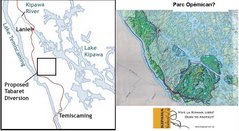
If Hydro Quebec is not actively pursuing Tabaret what is that bite out of Opemican for?
Kipawa Dam: After

Laniel Dam at 2006 Rally
Where is the Kipawa
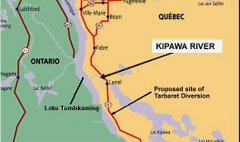
Kipawa flows into lake Temiskamingue, running from Kipawa Lake, under hwy 101 in Quebec
Kipawa Dam

laniel dam at 2004 River Rally
Tabaret is a Bad Idea
About the Kipawa
The best thing paddlers can do to help the cause of the Kipawa:
1. attend the rally and bring others including non paddlers to attend and buy beer and have fun
2. write your MP /MNA and raise the issue and post your objections -1 letter = 200 who didn't write
3. Write Thierry Vandal the CEO of Hydro Quebec strongly opposing the 132 MW standard decrying the use of "diversion" as the most environmentally inappropriate method of power production
4. Write Jean Charest, Premier of Quebec protesting that either the algonquin or the tabaret project will eliminate all other values on the Kipawa River by turning it into a dry gulch.
5. See if you can get other allied groups interested by showing your own interest, ie the Sierra Defense Fund, Earthwild, MEC, and so on.
6. Demand further consultation
7. Currently we are at the point where we need to sway public opinion and raise awareness.
However, if all else fails, don't get mad, simply disrupt, foment, and protest . The Monkey Wrench Gang.
Have you read Edward Abbey?
Important Addresses
CEO,Hydro Québec, 75 boul René Levesque, Montreal, P.Q., H2Z 1A4Caille.andre@hydro.qc.ca
The best thing paddlers can do to help the cause of the Kipawa:
1. attend the rally and bring others including non paddlers to attend and buy beer and have fun
2. write your MP /MNA and raise the issue and post your objections -1 letter = 200 who didn't write
3. Write Thierry Vandal the CEO of Hydro Quebec strongly opposing the 132 MW standard decrying the use of "diversion" as the most environmentally inappropriate method of power production
4. Write Jean Charest, Premier of Quebec protesting that either the algonquin or the tabaret project will eliminate all other values on the Kipawa River by turning it into a dry gulch.
5. See if you can get other allied groups interested by showing your own interest, ie the Sierra Defense Fund, Earthwild, MEC, and so on.
6. Demand further consultation
7. Currently we are at the point where we need to sway public opinion and raise awareness.
However, if all else fails, don't get mad, simply disrupt, foment, and protest . The Monkey Wrench Gang.
Have you read Edward Abbey?
Important Addresses
CEO,Hydro Québec, 75 boul René Levesque, Montreal, P.Q., H2Z 1A4Caille.andre@hydro.qc.ca
Tabaret is a Bad Idea (Part Two)
Les Amis de la Riviere Kipawa is poised to use an application to the Federal Court to issue a Writ of Mandamus to ensure the Minster does what he is supposed to do, protect the public's right to navigate the water control structure at Laniel, Quebec using the Navigable Waters Protection Act. (see http://www.kipawariver.ca/)
In the now gutted Navigable Waters Protection Act lay the means by which the Minister of Transport could keep the public right of passage down our great Canadian Heritage, our rivers and streams which are threatened especially by resource corporations and power brokers such as Hydro Quebec.
These powerful entities continue to petition that 'this' river or 'that' stream is not navigable and therefore not protectable.
I don't say that dams and bridges should not be built, only that if they are, historical navigation rights should be considered and preserved by making reasonable accommodations for recreational boaters.
It is the Minister of Transport, in exercising the right to allow or disallow work on or over a navigable waterway is what keeps boats and recreational boaters plying our waterways.
To many recent cases launched in the Federal Court concerning the Navigable Waters Protection Act, most recently the case of the Humber Environment Group of Cornerbrook Newfoundland versus the Cornerbrook Pulp and Paper Company indicates that the important oversight is not being faithfully performed. Have we really come to the point now where we must say "such and such a stream is one foot deep, possessing so many cubic feet per second flow and so on?" The answer to this is... YES!
The honourable Mr. Justice John A. O'Keefe, ruled that it had not been shown that the river was navigable. How convenient was that to the Minister? But either the Minister of Transport acts to protect our rivers and streams as a public right or he does not and that means rivers and streams currently enjoyed by kayakers and canoists.
Enough of the cheating, and double-talk. Canadians! our rivers and streams are our own, lets urge the Minister of Transport and the our government to protect them.
Peter Karwacki
In the now gutted Navigable Waters Protection Act lay the means by which the Minister of Transport could keep the public right of passage down our great Canadian Heritage, our rivers and streams which are threatened especially by resource corporations and power brokers such as Hydro Quebec.
These powerful entities continue to petition that 'this' river or 'that' stream is not navigable and therefore not protectable.
I don't say that dams and bridges should not be built, only that if they are, historical navigation rights should be considered and preserved by making reasonable accommodations for recreational boaters.
It is the Minister of Transport, in exercising the right to allow or disallow work on or over a navigable waterway is what keeps boats and recreational boaters plying our waterways.
To many recent cases launched in the Federal Court concerning the Navigable Waters Protection Act, most recently the case of the Humber Environment Group of Cornerbrook Newfoundland versus the Cornerbrook Pulp and Paper Company indicates that the important oversight is not being faithfully performed. Have we really come to the point now where we must say "such and such a stream is one foot deep, possessing so many cubic feet per second flow and so on?" The answer to this is... YES!
The honourable Mr. Justice John A. O'Keefe, ruled that it had not been shown that the river was navigable. How convenient was that to the Minister? But either the Minister of Transport acts to protect our rivers and streams as a public right or he does not and that means rivers and streams currently enjoyed by kayakers and canoists.
Enough of the cheating, and double-talk. Canadians! our rivers and streams are our own, lets urge the Minister of Transport and the our government to protect them.
Peter Karwacki
Tabaret is a Bad Idea (Part Three)
10 Reasons WhyTabaret is a Bad Idea1) Tabaret is too big. The station is designed to useevery drop of water available in the Kipawawatershed, but will run at only 44 percent capacity.We believe the Tabaret station is designed to usewater diverted from the Dumoine River into theKipawa watershed in the future.
2) The Tabaret project will eliminate the aquaticecosystem of the Kipawa River.The Tabaret project plan involves the diversion of a16-km section of the Kipawa River from its naturalstreambed into a new man-made outflow from LakeKipawa.
3) Tabaret will leave a large industrial footprint on thelandscape that will impact existing tourismoperations and eliminate future tourism potential.
4) The Tabaret project is an aggressive single-purposedevelopment, designed to maximize powergeneration at the expense of all other uses.
5) River-diversion, such as the Tabaret project, takinglarge amounts of water out of a river’s naturalstreambed and moving it to another place, is verydestructive to the natural environment.
6) The Kipawa River has been designated a protectedgreenspace in the region with severe limitations ondevelopment. This designation recognizes theecological, historical and natural heritage value ofthe river and the importance of protecting it.Tabaret will eliminate that value.
7) If necessary, there are other, smarter and morereasonable options for producing hydro power onthe Kipawa watershed. It is possible to build a lowimpactgenerating station on the Kipawa river, andmanage it as a “run-of-the-river” station, makinguse of natural flows while maintaining other values,with minimal impact on the environment.
8) The Kipawa watershed is a rich natural resource forthe Temiscaming Region, resonably close to largeurban areas, with huge untapped potential fortourism and recreation development in the future.Tabaret will severely reduce this potential.
9) Tabaret provides zero long-term economic benefitfor the region through employment. The plan is forthe station to be completely automated andremotely operated.
10) The Kipawa River is 12,000 years old. The riverwas here thousands of years before any peoplecame to the region. The Tabaret project will change all that.
Problems on a local River?
- There is more to do as well but you have to do your research and above all, don't give up.
- IN the meantime prepared a document itemizing the history of navigation of this spot and its recreational value. Use the Kipawa river history of navigation as a guide: see www.kipawariver.ca
- Under the Ministry of Environment guidelines you have a set period of time to petition the change under the environmental bill of rights, you may have limited time to take this action. But it involves going to court for a judicial review of the decision.
- 4. contact the ministry of natural resources officials and do the same thing.
- 3. contact the ministry of the environment and determine if they approved the project
- 2. determine if the dam was a legal dam, approved under the navigable waters protection act.
- 1. research the decision and timing of it to determine if an environmental assessment was done.
Minden Ontario
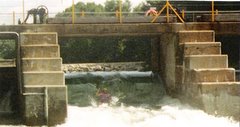
Gull River Water control at Horseshoe lake
A History of Navigation on the Kipawa River
Prior to the environmental assessment there was no signage at the Laniel Dam
T-Shirts Area: These are available now!

Send $25 and a stamped self addressed envelop for the Tshirt, and for the bumper sticker, a stamped and self addressed envelope with $5.00 for the bumper sticker to Les Amis de la rivière Kipawa, 80 Ontario St., Ottawa, Ontario, K1K 1K9 or click the link To purchase a Les Amis "T" contact Doug with the following information: Number of shirts:Sizes: Ship to Address: Method of Payment: cash, cheque and paypal, Shipto address:
Bumper Stickers Now Available

Get your bumper sticker and show your support for the Kipawa Legal Fund ! - send $5.00 in a Stamped, self addressed envelope to: Peter Karwacki Box 39111, Ottawa, Ontario, Canada, K1H 7X0

